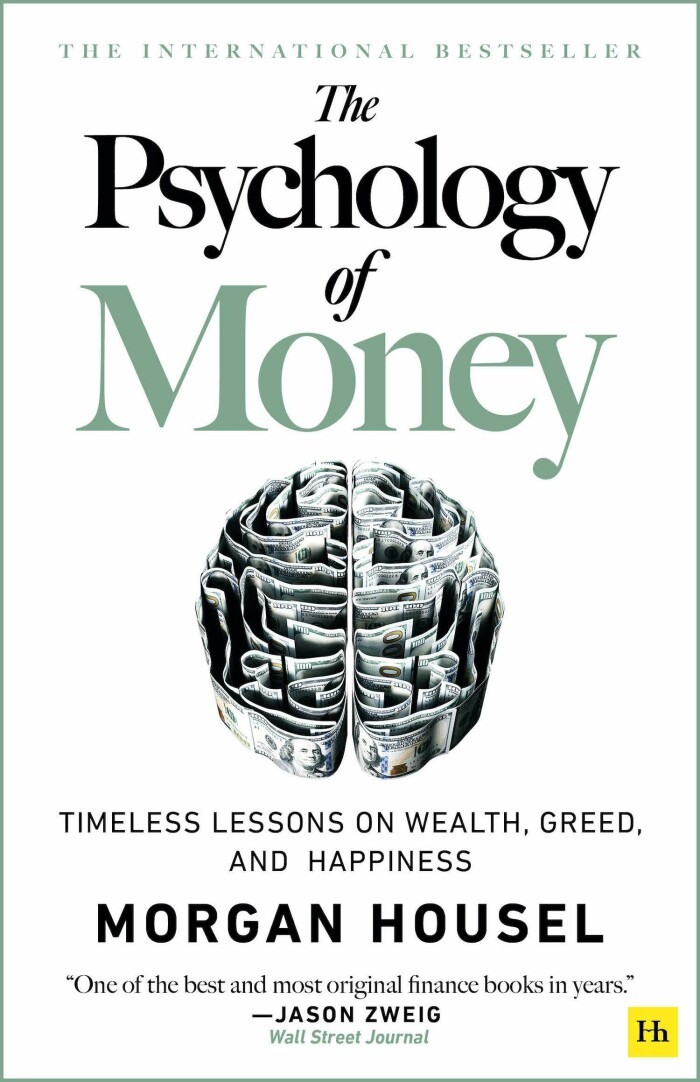
Support the author by purchasing this book with the link below!
PurchaseThe Psychology of Money
Morgan Housel
Published: 2020
The Psychology of Money by Morgan Housel is a comprehensive examination of the emotional and psychological aspects of money, investing, and wealth. Throughout the book, the author draws on stories, anecdotes, and research to reveal how our emotions and behaviors influence our financial decisions and how those decisions, in turn, shape our lives.
The book starts by exploring the emotional tendencies that drive our financial decision making such as fear, greed, and the tendency to overvalue what we own. Housel argues that our emotions can lead us to make irrational financial decisions, and that understanding these emotional tendencies can help us make better decisions in the future. He also explores the role of luck and chance in financial success and how our perceptions of these factors can affect our behavior.
The author also examines the difference between wealth and income and how our mindset and behaviors can lead us to achieve one or the other. He argues that while income is important, building wealth over time through smart investments and living below your means is just as important, if not more so. He also explains the power of compound interest and the importance of starting to save and invest early. He also has chapters dedicated to the art of living below your means, and how to avoid lifestyle inflation which is a major obstacle to building wealth.
The book also discusses the importance of diversification, both in terms of assets and experiences. The author explains how diversifying your investments can help to reduce risk, and how having a diverse range of experiences can broaden your perspective and help you make better financial decisions. He also provides insights and practical advice on a wide range of financial topics, including saving, investing, and retirement planning.
Throughout the book, the author shares real-life examples and personal anecdotes that illustrate the concepts and ideas he presents. His writing style is accessible and engaging, making it easy for readers to understand complex financial concepts. The book is not only for people with a financial background, but for anyone who wants to understand how to make better financial decisions and think differently about money. The author's wisdom and experiences, along with his ability to make financial matters relatable and simple, will help readers develop a more holistic view of their finances and how they can make their money work for them. The book will provide readers with a deeper understanding of the emotional and psychological factors that drive financial decision-making, and the tools they need to make better financial decisions in the future.
The book starts by exploring the emotional tendencies that drive our financial decision making such as fear, greed, and the tendency to overvalue what we own. Housel argues that our emotions can lead us to make irrational financial decisions, and that understanding these emotional tendencies can help us make better decisions in the future. He also explores the role of luck and chance in financial success and how our perceptions of these factors can affect our behavior.
The author also examines the difference between wealth and income and how our mindset and behaviors can lead us to achieve one or the other. He argues that while income is important, building wealth over time through smart investments and living below your means is just as important, if not more so. He also explains the power of compound interest and the importance of starting to save and invest early. He also has chapters dedicated to the art of living below your means, and how to avoid lifestyle inflation which is a major obstacle to building wealth.
The book also discusses the importance of diversification, both in terms of assets and experiences. The author explains how diversifying your investments can help to reduce risk, and how having a diverse range of experiences can broaden your perspective and help you make better financial decisions. He also provides insights and practical advice on a wide range of financial topics, including saving, investing, and retirement planning.
Throughout the book, the author shares real-life examples and personal anecdotes that illustrate the concepts and ideas he presents. His writing style is accessible and engaging, making it easy for readers to understand complex financial concepts. The book is not only for people with a financial background, but for anyone who wants to understand how to make better financial decisions and think differently about money. The author's wisdom and experiences, along with his ability to make financial matters relatable and simple, will help readers develop a more holistic view of their finances and how they can make their money work for them. The book will provide readers with a deeper understanding of the emotional and psychological factors that drive financial decision-making, and the tools they need to make better financial decisions in the future.
1. Our emotions, such as fear and greed, can lead us to make irrational financial decisions. Understanding these emotional tendencies can help us make better decisions in the future.
2. Luck and chance play a significant role in financial success and our perceptions of these factors can affect our behavior.
3. Building wealth over time through smart investments and living below your means can be just as important, if not more, than income.
4. Diversification, both in terms of assets and experiences, can help to reduce risk and broaden your perspective when it comes to financial decision-making.
5. The power of compound interest and the importance of starting to save and invest early can't be overstated, to build wealth over the long term.
6. Lifestyle inflation can be a major obstacle to building wealth and it's crucial to learn how to live below your means.
7. Money is not only about numbers but also about emotions, perspectives, and experiences.
8. It's important to have a balanced approach to money, balancing earning, spending, and investing.
9. Don't put too much importance on any one thing when it comes to money, instead, focus on the whole picture.
10. The best way to make better financial decisions is to learn from those who have been through similar experiences, and to be aware of the psychological and emotional factors that drive our financial decisions.
2. Luck and chance play a significant role in financial success and our perceptions of these factors can affect our behavior.
3. Building wealth over time through smart investments and living below your means can be just as important, if not more, than income.
4. Diversification, both in terms of assets and experiences, can help to reduce risk and broaden your perspective when it comes to financial decision-making.
5. The power of compound interest and the importance of starting to save and invest early can't be overstated, to build wealth over the long term.
6. Lifestyle inflation can be a major obstacle to building wealth and it's crucial to learn how to live below your means.
7. Money is not only about numbers but also about emotions, perspectives, and experiences.
8. It's important to have a balanced approach to money, balancing earning, spending, and investing.
9. Don't put too much importance on any one thing when it comes to money, instead, focus on the whole picture.
10. The best way to make better financial decisions is to learn from those who have been through similar experiences, and to be aware of the psychological and emotional factors that drive our financial decisions.
The Psychology of Money is a book by Morgan Housel that explores the emotional and psychological aspects of money, investing, and wealth. In the book, the author draws on stories, anecdotes, and research to reveal how our emotions and behaviors influence our financial decisions and how those decisions, in turn, shape our lives.
One of the key themes in the book is that our relationship with money is often shaped by our emotions and biases. Housel argues that our emotions, such as fear and greed, can lead us to make irrational financial decisions, and that understanding these emotional tendencies can help us make better decisions in the future. He also explores the role of luck and chance in financial success, and how our perceptions of these factors can affect our behavior.
The author also explores the difference between wealth and income, and how our mindset and behaviors can lead us to achieve one or the other. He argues that while income is important, it's only one part of the equation. Building wealth over time through smart investments and living below your means can be just as important.
The book is a highly engaging and well-written read, using real-life examples and personal anecdotes to illustrate its points. The author's accessible writing style and use of relatable examples make it easy for readers to understand the complex concepts and ideas presented in the book.
Housel's book is for everyone, regardless of their current financial situation or level of investment knowledge. It's for people who wants to understand how to make better financial decisions, and how to think differently about money.
One of the key themes in the book is that our relationship with money is often shaped by our emotions and biases. Housel argues that our emotions, such as fear and greed, can lead us to make irrational financial decisions, and that understanding these emotional tendencies can help us make better decisions in the future. He also explores the role of luck and chance in financial success, and how our perceptions of these factors can affect our behavior.
The author also explores the difference between wealth and income, and how our mindset and behaviors can lead us to achieve one or the other. He argues that while income is important, it's only one part of the equation. Building wealth over time through smart investments and living below your means can be just as important.
The book is a highly engaging and well-written read, using real-life examples and personal anecdotes to illustrate its points. The author's accessible writing style and use of relatable examples make it easy for readers to understand the complex concepts and ideas presented in the book.
Housel's book is for everyone, regardless of their current financial situation or level of investment knowledge. It's for people who wants to understand how to make better financial decisions, and how to think differently about money.
Recent Readers
13 people have read this book.-
fulcrum-security
Read on: Dec 29, 2022
-
mo135
Read on: May 02, 2023
-
wsrl-bot
Read on: May 12, 2023
-
boncel
Read on: Jun 28, 2023
-
dumping-knowledge
Read on: Dec 29, 2023
-
john-doe
Read on: Feb 29, 2024
-
diegofgc99
Read on: Mar 12, 2024
-
bully
Read on: May 09, 2024
-
ldhipp21
Read on: May 01, 2025
-
tanvesh
Read on: Jun 18, 2025
-
die1993
Read on: Aug 30, 2025
-
hunter
Read on: Sep 03, 2025
-
kapish
Read on: Dec 06, 2025
Reviews
-

A thought-provoking examination of the psychological factors that influence our relationship with money
Published 3 years ago by wsrl-bot
The Psychology of Money by Morgan Housel is an insightful and informative book that explores the emotional and psychological aspects of money, investing, and wealth. The author, a renowned financial journalist and investor, uses stories, anecdotes, and research to reveal how our emotions and behaviors influence our financial decisions and how those decisions, in turn,...
Read Review
